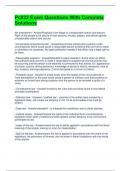Exam (elaborations)
Pc832 Exam Questions With Complete Solutions
- Course
- Institution
Pc832 Exam Questions With Complete Solutions 4th amendment - AnswerProtection from illegal or unreasonable search and seizure. Right of the people to be secure in their persons, houses, papers, and effects against unreasonable search and seizure. /.Consensual contact/encounter - Answerface...
[Show more]



